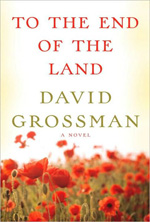The pain is physical, it’s emotional, and it’s constant as Ora and Avram hike Israel’s northernmost reaches. But it’s impossible for them — and us — to ignore the beauty of the spring, the budding flowers through verdant fields. The detail woven throughout David Grossman’s To the End of the Land (Knopf, 2010, $26.95), an expansive and intimate journey by two former lovers as they once again get to know each other, is only the surface of what becomes more than just a walk in the woods. It’s the history of a family told through the violent recent history of a country — and vice versa.
Given the timing and subject matter of the story — Ora’s son Ofer has voluntarily returned to the army during the Arab revolt in 2000, and it was he who was supposed to have been hiking with his mother — it’s difficult to write about the story without some mention of the author. As he was completing the book, Grossman’s son Uri was among the few soldiers killed in the 2006 Lebanon war. Much has been written about 21-year-old Ofer’s stand-in role as Uri, but Grossman writes in the afterword that though he had hoped this book would protect his son, “After we finished sitting shiva I went back to the book. Most of it was already written. What changed, above all, was the echo of the reality in which the final draft was written.”
Still, so much of the story centers around this son who isn’t even there. Grossman deftly gives us bits and pieces about the family’s secrets, so to explain more gives away too much. But his presence puts into play this sprawling novel so representative of the modern psyche of Israel writ small.
To the End of the Land is actually a story in three acts. The first and third are really most integral to the story while the second is a way to bridge the two. What’s disappointing about this structure is that it introduces the second section’s protagonist Sami, Ora’s family’s longtime driver and an Israeli Arab who grudgingly delivers Ofer to the sendoff of the campaign against his people. Sami then drops the befuddled Ora and the semi-catatonic Avram on the side of the road and drives off in a cloud of smoke, never to be heard from again. We never get closure.
But that’s a minor quibble in a story that has more depth, more realism, and, to be honest, more pages than most contemporary novels. In the first part, during the Six Day War in 1967, we meet young teenagers Ora, Avram and Ilan, who have been abandoned in a medical clinic while the rest of the country hides in their bunkers. Through various waves of fever-induced hallucinations and fainting spells, the three establish a relationship that, as they grow older, becomes much more complicated both emotionally and sexually. Nearly three decades later, as we meet them again, Ilan and Ora’s marriage has fallen apart. They haven’t seen Avram, once a poet and masterful linguist who now can’t get a handle on functioning society, in close to 20 years. And it seems oddly coincidental that he calls Ora on the same day Ofer gets discharged from the military. She drags him on her shoulders down three flights of stairs while he detoxes from a sleeping pill-induced stupor and takes him on the weeklong hike instead.
Once Sami dumps them on the side of the road, the novel turns from straightforward narration to true storytelling. If he hadn’t mastered the craft before, Grossman’s weaving of present with the past, sometimes from paragraph to paragraph, works as only someone skilled with the written word can make it work. Jessica Cohen’s translation from the Hebrew, it should be noted, makes the transition to English just as seamless. A drawback to this method is that Grossman oftentimes shifts us from Ora’s head to Avram’s and then back, when conventional writing courses admonish us to keep to a single perspective.
As they walk, Avram begins to wake from the sleep that has enveloped him for nearly his entire adult life, and Ora finally begins to understand the mindsets of all of the men in her life, from her lovers to her estranged husband to her children, and that she can’t always protect them all. We learn about the conception of her children, their births and the revelations attendant to both; we see tender moments between husband and wife and otherwise mundane events that make each family unique; we learn, eventually, that secrets, no matter how dark and how long they are kept, will eventually, somehow, see the light of day.
Grossman can be graphic, whether it’s in the realm of sex or violence, but nothing is gratuitous. Just as shockingly as the story begins, so it ends. What is, is, and that’s that. But the flowers still bloom.
The mindset of the Israeli people, in the guise of a family
